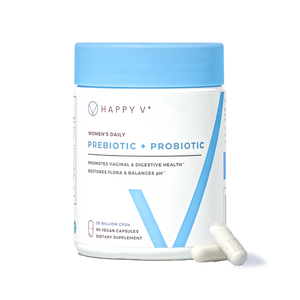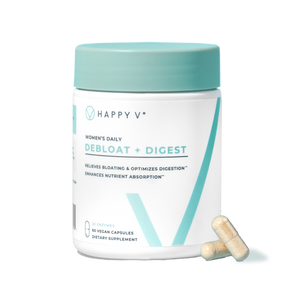- Fact Checked
- September 02, 2025
- 10 min read
What is Perimenopause? Your Guide to This Natural Life Transition
Table of Contents
Table of Contents
Perimenopause might sound like an intimidating medical term, but it's simply your body's natural way of transitioning toward menopause. Think of it as your reproductive system's graceful curtain call, a time when hormonal fluctuations create changes that signal the end of your childbearing years.
While this transition can bring challenges, it's also an opportunity to tune into your body's needs and embrace this new phase of life with confidence and vitality. Understanding perimenopause empowers you to navigate this journey with greater ease and make informed choices about your health and well-being.
This post is for informational purposes only and does not constitute medical advice. See full disclaimer below.
What is Perimenopause?
Perimenopause, literally meaning "around menopause," is the transitional period leading up to menopause when your body begins to make less estrogen and progesterone1. During this time, your ovaries gradually reduce hormone production, leading to hormonal fluctuations that can affect various aspects of your health and well-being.
This natural biological process involves changes in your menstrual cycle patterns, ovarian function, and hormone levels, including estradiol, follicle-stimulating hormone (FSH), and luteinizing hormone (LH)2.
Your body is essentially preparing for the end of menstruation and fertility, but this preparation happens gradually over several years rather than all at once.
When Does Perimenopause Occur?
Perimenopause typically begins in a woman's 40s, though it can start as early as the mid-30s or as late as the early 50s. The average duration of perimenopause is about 4-8 years, but this can vary significantly from person to person.
Several factors can influence the onset and timing of perimenopause:
- Genetics and family history - If your mother or sisters experienced early or late menopause, you might follow a similar pattern
- Lifestyle factors - Cigarette smoking can lead to earlier onset
- Medical procedures - Hysterectomy or oophorectomy can trigger immediate hormonal changes that can then trigger perimenopause or menopause
- Health conditions - Certain conditions, like premature ovarian insufficiency (POI), may affect the natural aging process of your ovaries
Relationship to Menopause
Perimenopause is the bridge between your reproductive years and menopause3. While perimenopause involves irregular menstrual cycles and fluctuating hormones, menopause is officially defined as occurring 12 months after your final menstrual period4.
Think of perimenopause as the "getting ready" phase, where your body gradually adjusts hormone production, while menopause marks the completion of this transition.
Symptoms and Signs of Perimenopause
Perimenopause can bring a wide variety of symptoms as your hormone levels fluctuate throughout this transitional period. The fluctuation in hormones also means that these symptoms can vary in intensity from month to month—or even day to day!
If you are feeling any intense symptoms, also know that you don’t have to live with them. There are lots of ways (many of them natural!) to relieve perimenopausal symptoms.
Menstrual and Reproductive Changes:
- Irregular periods - Cycles may become shorter (21 days or less) or longer (35+ days), with unpredictable timing
- Changes in menstrual flow - Periods may become heavier, lighter, or vary significantly from month to month
- Spotting between periods - Light bleeding or spotting may occur between regular cycles
- Missed periods - You may occasionally skip periods entirely as ovulation becomes less regular
Vasomotor Symptoms (Temperature Regulation):
- Hot flashes - Sudden feelings of intense heat, often accompanied by sweating and flushing5
- Night sweats - Hot flashes that occur during sleep, potentially disrupting rest
- Cold flashes - Less common but some women experience sudden chills
Sleep and Energy Changes:
- Sleep problems - Difficulty falling asleep, staying asleep, or experiencing restful sleep6
- Fatigue - Persistent tiredness that doesn't improve with rest7
- Changes in sleep patterns - Waking up earlier or needing more sleep than usual
Physical and Bodily Changes:
- Vaginal dryness - Decreased natural lubrication due to declining estrogen levels8
- Weight gain and metabolism changes - Particularly around the midsection, as hormone changes affect fat distribution
- Joint pain and stiffness - Aches in joints, muscles, or general body stiffness
- Breast tenderness - Changes in breast sensitivity or comfort
- Headaches - New onset or changes in frequency/intensity of headaches
- Dry skin and hair changes - Skin may become drier, and hair texture may change9
- Changes in body odor - Some women notice differences in natural scent
Cognitive and Neurological Symptoms:
- Brain fog - Difficulty with concentration, memory, or mental clarity
- Memory lapses - Forgetting names, words, or where you put things10
- Difficulty concentrating - Trouble focusing on tasks or conversations
Emotional and Psychological Changes:
- Mood swings - Rapid changes between different emotional states11
- Anxiety - New or increased feelings of worry, nervousness, or panic
- Depression - Persistent sadness, hopelessness, or loss of interest in activities
- Irritability - Feeling more easily annoyed or frustrated than usual
- Emotional sensitivity - Crying more easily or feeling overwhelmed by emotions
- Decreased libido - Reduced interest in sexual activity
Urinary and Bladder Changes:
- Increased urgency - Feeling like you need to urinate more frequently12
- Urinary incontinence - Occasional leaking, especially when laughing, coughing, or exercising
- Recurrent urinary tract infections - Some women experience more frequent UTIs13
The Complete Guide to Perimenopause: Understanding All 34 Symptoms and Finding Relief explores the complete list of symptoms, their effect on your day-to-day life, as well as management strategies you can try.
Fertility and Pregnancy During Perimenopause
Perimenopause is not the end of fertility, but it does signal a significant decline in reproductive potential14. Ovulation becomes irregular, making it harder to predict fertile windows.
While natural conception is possible until menopause is officially reached, fertility decreases due to fewer and lower-quality eggs.
When it comes to pregnancy during this period, women must consider:
- Declining fertility: Egg reserve and quality naturally decrease, reducing chances of conception.
- Unplanned pregnancies: Because cycles can skip and return unpredictably, women may mistakenly believe pregnancy isn’t possible. Birth control is still necessary if you want to avoid a pregnancy
- Pregnancy risks: Conception during perimenopause is associated with higher risks of miscarriage, chromosomal abnormalities, gestational diabetes, preeclampsia, and complications during delivery.
For women still considering pregnancy in the perimenopausal years, healthcare providers may recommend fertility testing or exploring assisted reproductive options. Others may focus on effective contraception until menopause is complete. Either way, open conversations with a doctor help ensure the best care and preparation.
Health Risks Associated with Perimenopause
Beyond reproductive changes, perimenopause introduces shifts that can impact long-term health. Hormonal fluctuations—especially declining estrogen—affect multiple systems in the body:
- Bone health: Reduced estrogen accelerates bone loss, raising the risk of osteoporosis and fractures15.
- Cardiovascular health: Estrogen helps regulate cholesterol and blood vessel flexibility. As levels decline, LDL (“bad” cholesterol) may rise, blood pressure may increase, and heart disease risk grows.
- Metabolic changes: Weight tends to redistribute around the abdomen, and insulin sensitivity decreases, raising the likelihood of type 2 diabetes.
- Urinary and sexual health: Vaginal dryness, urinary incontinence, and recurrent urinary tract infections can become more frequent.
- Cognitive and emotional health: Hormone fluctuations may contribute to brain fog, mood swings, anxiety, or depression, sometimes compounded by sleep disturbances.
We don’t tell you these things to scare you, but to empower you! When you understand the risks involved with this inevitable life change, you will be able to take more proactive steps (think: weight-bearing exercise, heart-healthy nutrition, bone density screening, and mental health support) to protect your health through this transition and beyond.
How to Manage Symptoms
Please, please don’t suffer through menopause symptoms. While the “grin and bear it” mentality has dominated the world of perimenopause, the truth is, there are lots of effective ways to manage uncomfortable symptoms and stop them from disrupting your life. And it all starts with a conversation with your gynecologist or other healthcare professional.
Lifestyle Modifications:
- Nutrition focus - Ensure adequate calcium and vitamin D intake to support bone health
- Weight-bearing exercises - Regular physical activity helps manage weight and supports bone density
- Stress-reducing practices - Meditation, yoga, or other mindfulness techniques can help with emotional balance
- Sleep habits - Maintain good sleep hygiene to combat fatigue and night sweats
- Self-nurturing - Prioritize activities that support your mental and emotional wellbeing
Medical Treatment Options:
- Hormone replacement therapy - Including systemic estrogen therapy or combination treatments
- Continuous-combined hormone contraceptives - Can help regulate cycles and manage symptoms
- Levonorgestrel IUD plus estrogen therapy - For women who need both contraception and hormone support
- Low-dose vaginal products - Specifically for vaginal dryness and related concerns
- Non-hormone treatment options - Such as antidepressants or gabapentin for specific symptoms
- Natural remedies and supplements - Many natural supplements, like Happy V’s Menopause Relief, are formulated to support women during perimenopause and menopause. Happy V’s formula is unique because it includes ingredients clinically studied for menopause symptom relief. Its dual pill, AM/PM dosage also helps to confront symptoms around the clock, with the morning pill designed to reset your hormones and energy levels and the evening pill designed to help you mitigate night sweats and insomnia to get the rest you deserve.
Professional Support:
- Schedule routine yearly check-ups to monitor your health
- Consider working with a Menopause Society Certified Practitioner (MSCP) for specialized care
- Use period tracker apps or maintain a journal of menstrual cycles to identify patterns
- Explore mental health therapy if needed for additional coping skills and psychological resilience
Remember, perimenopause is a natural part of life, and with the right information, support, and management strategies, you can navigate this transition with confidence and maintain your vitality.
Every woman's journey is unique, so work with your healthcare provider to develop a personalized approach that works best for your individual needs and circumstances.
When To See Your Doctor
While perimenopause is natural, certain situations warrant professional medical attention. Consider scheduling an appointment with your gynecologist or a certified menopause practitioner if you experience:
- Abnormal vaginal bleeding - This includes heavier than usual bleeding, bleeding between periods, or any bleeding patterns that concern you
- Severe symptoms - Hot flashes, mood changes, or other symptoms that significantly impact your quality of life
- Mental health concerns - Persistent anxiety, depression, or mood changes that interfere with daily activities
- Sexual function changes - Issues that affect your relationships or well-being
- Questions about treatment options - If you're considering hormone therapy or other management strategies
Your healthcare provider can perform hormone testing, review your medical history, conduct physical exams including pelvic exams, and help you track your menstrual cycles to better understand your individual experience.
Final Thoughts
Perimenopause is a natural, powerful transition that marks the bridge between your reproductive years and the next stage of life. While the hormonal shifts can bring challenges including fertility changes and other health risks, they also create an opportunity to prioritize your well-being in new ways. By understanding what’s happening in your body, you can make informed choices about family planning, symptom management, and long-term health protection.
Every woman’s journey is unique, but you don’t have to navigate it alone. With support from healthcare providers, lifestyle adjustments, and tools designed to ease the transition, perimenopause can become less about loss and more about empowerment. By staying proactive and compassionate toward yourself, you can embrace this chapter with strength, confidence, and the knowledge that investing in your health today sets the stage for vitality in the years ahead.
Keep the Conversation Going
- Visit our blog for more women’s health tips.
- Join our private Happy V Facebook group to hear from others who’ve been there.
- Explore supplements designed to support your vaginal health journey.
Disclaimer: This blog is for informational and educational purposes only and is not intended to diagnose, treat, cure, or prevent any disease. Statements about supplements have not been evaluated by the Food and Drug Administration. For more information about vaginal infections, visit the CDC or speak to a licensed healthcare provider.












